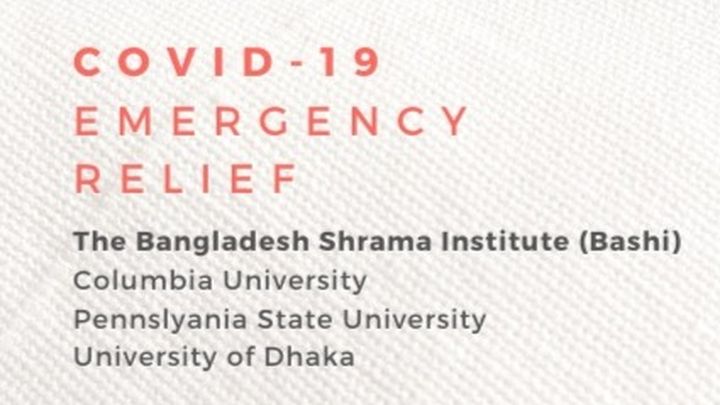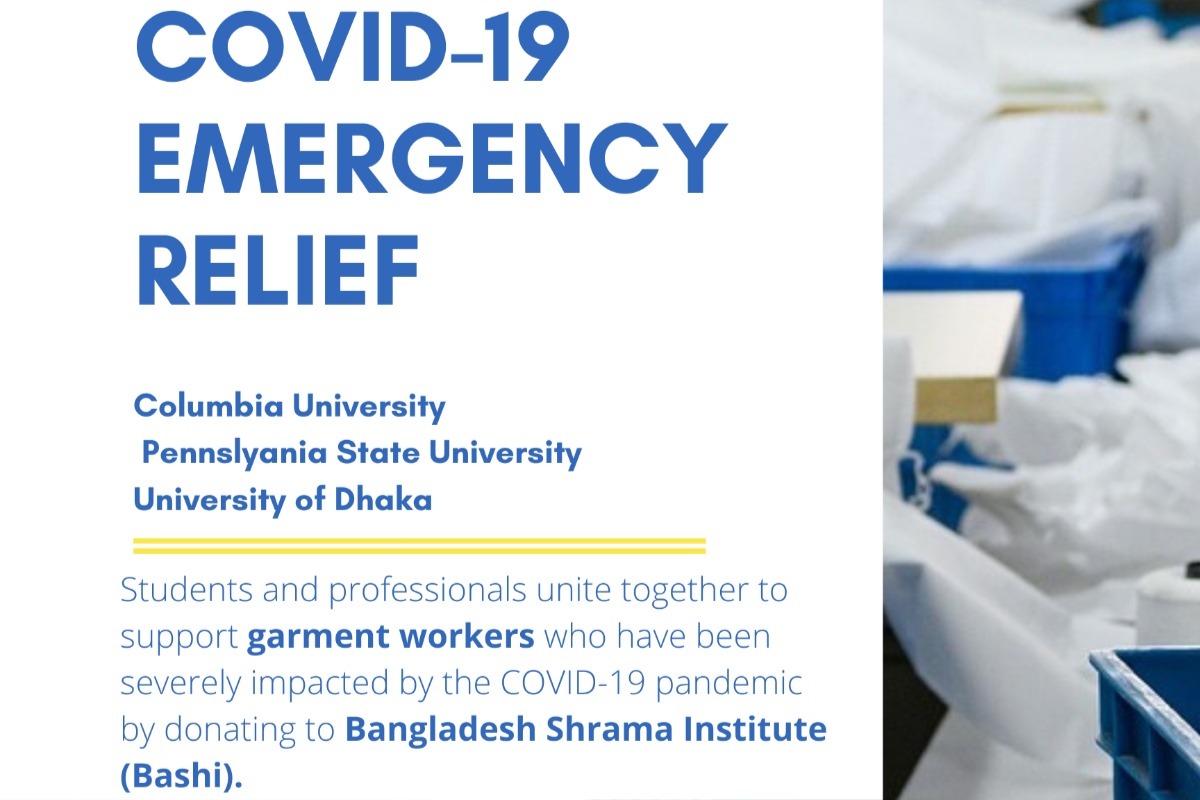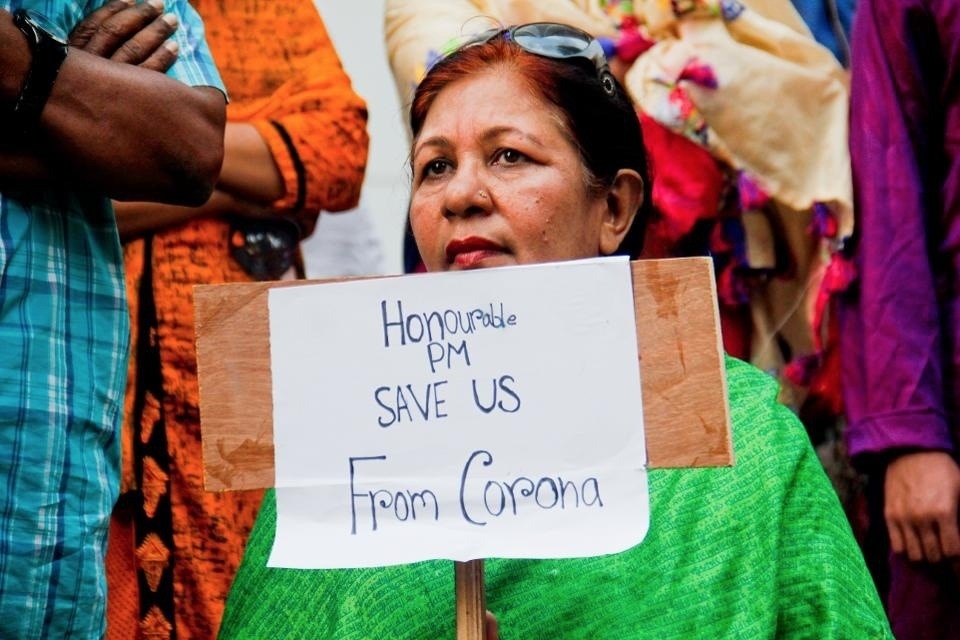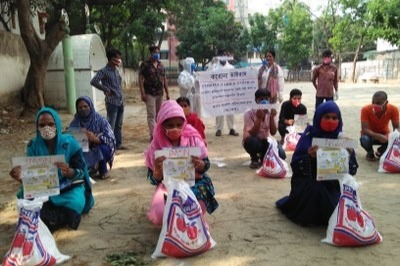
COVID-19 Relief for Garment Workers in Bangladesh
Donation protected

After the outbreak of the COVID-19 pandemic crisis, millions of garment factory workers in Bangladesh were laid-off since brands canceled and postponed orders. The garment workers were sent home without any wages or severance payments. As students, scholars, and professionals, we stand in solidarity with the garment workers to overcome this significant health, economic and human rights challenge.
Students and professionals from Columbia University School of International and Public Affairs, Pennsylvania State University Center for Global Workers' Rights, and the University of Dhaka are collaborating to launch this fundraising initiative and donnating to BASHI . BASHI will distribute the donations (Food) to the garment workers through its networks with trade unions.
-------------------------------------------------------------------------------------------------------------------------------
SOME STATISTICS:
- "At least 1.2 million workers had already been affected by the order cancellations"(Wright, Beth, Just-Style, March 2020).
- "72.4% of furloughed workers were sent home without pay" (Anner, Mark, CGWR, March 2020).
- “98.1% of buyers refused to contribute to the cost of paying the partial wages to furloughed workers that the law requires” (Anner, Mark, CGWR, March 2020).
- "97.3% of suppliers responded that buyers provided no such support " (Anner, Mark, CGWR, March 2020).
- "According to the BGMEA, up to 500,000 workers could lose their jobs in June 2020" (McNamara, Mei-Ling, the Guardian, June 2020).
- One worker, Hasina , who worked in a factory supplying Kohl’s, is pregnant and lost her job in April.
“They fired me in the same way they fired my other pregnant colleague,” she said. “They did not pay us our wages, compensation or benefit, which I was owed after six years working there. The factory told us brands have cancelled or suspended goods that were ready to deliver. “I have given all my energy making clothes for very low wages. Manufacturers and fashion brands can profit off the clothes, but nobody cares for us when we are suffering.” (McNamara, Mei-Ling, the Guardian, June 2020.)

Source: Clean Clothes Campagin. "April 2020: Coronavirus and garment workers in supply chains." April 26, 2020. Retrieved from: https://cleanclothes.org/news/2020/april-2020-covid19-blog
 Source: Clean Clothes Campagin. "April 2020: Coronavirus and garment workers in supply chains." April 26, 2020. Retrieved from: https://cleanclothes.org/news/2020/april-2020-covid19-blog
Source: Clean Clothes Campagin. "April 2020: Coronavirus and garment workers in supply chains." April 26, 2020. Retrieved from: https://cleanclothes.org/news/2020/april-2020-covid19-blog-------------------------------------------------------------------------------------------
A Brief Profile of Bangladesh Shrama Institute (Bashi)
- Type of institution: Foundation
- Geographic area of work: Anywhere in Bangladesh
- Website: bashibd.com
- Contact person: Priscilla Raj
- Contact number: 01534-926762
- Email: [email redacted]
- Address: House# 72, 5th floor, Road# 3, Sangbadik Abasik Elaka, Mirpur-11, Dhaka.
1. Type of institution and aim
Bangladesh Shrama Institute (Bashi) is a foundation formed under The Trust Act in Bangladesh in 2015. It is a labour research and welfare institute. Its aim is promoting the rights of the workers in all sectors through research, activism, policy advocacy, behaviour change communication, capacity building and welfare initiatives.
2. Structure
Bashi has a 3-member trustee body at the apex. As the organisation is still young, its day-to-day activities are run by an ad-hoc executive committee. It also has a general committee whose members elect the executive committee members. Planning and decision making are carried out with the participation of all three bodies.
3. Major Activities (2015-2020)
A series of seminar on national minimum wage in which labour leaders, trade unionists and experts participated.
A study on the challenges women face in Bangladesh in joining trade unions and labour. organisations. Completed with final report presented to stakeholders.
A study on the aspects of day care centres for low-income families in Bangladesh. Final report under preparation.
A report on the situation of survivors and victims’ families of Rana Plaza collapse published on Bashi website the occasion of 2nd anniversary of the collapse.
A book in Bengali titled “Majuri Manush Sangram” (Wage, Human Beings and Struggle) was published in 2016 containing articles focusing on the movement for national minimum wage in Bangladesh.
A series of workshops with industrial workers about Bangladesh Labour Law.
Regular workshops and meetings focusing on building organisational capacity of workers to establish, lead and run their own organisations successfully.
Regular meetings with laid off workers and job aspirants of low income families about the prospective areas of training and courses which will enable them to get jobs.
Emergency assistance provided to over 200 families in Gazipur Sadar, Tongi, Savar and Ashulia industrial belt who faced starvation during the government holiday for over two months. Supported emergency caesarean section delivery of a pregnant worker who was deserted by husband. The fund was collected through member contribution and public donations.
Starting a pilot initiative to support 10 women who have lost jobs recently to start micro enterprise.
4. Commitment
Bashi is committed to democratic decision making and execution and continuous learning. It is committed to transparency of all it does and all it spends.
 Organizer and beneficiary
Organizer and beneficiary
Jade Song
Organizer
New York, NY
Chandni Das
Beneficiary


